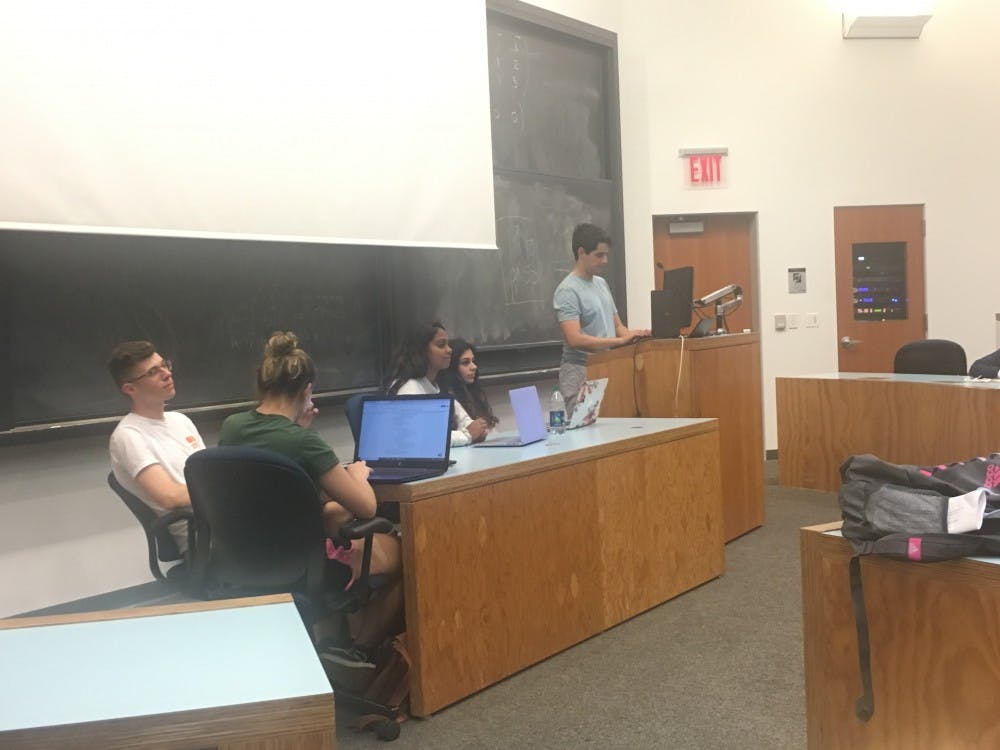At their weekly meeting, the Undergraduate Student Government (USG) Senate weighed in on new task force proposals and listened to a presentation on a potential new guest speaker invite system on Sunday, Sept. 22.
Tyler Eddy ’21, a student in the astrophysics department, presented his proposal for “AllVoice,” a new mechanism for students to invite speakers to campus. The goal of the program, according to Eddy, would be to “expand dialogue on campus by creating more diverse events and speakers.”
“It’s not an issue of quantity or quality of speakers,” he clarified at the start. “It’s an issue of ‘Is it representative of the country and beyond?’”
The new mechanism would allow students to propose a potential speaker and endorse speakers they would like to see come to campus. Each speaker would only need a minimum of 10 endorsements to move on to the next voting round, a rule that Eddy believes would promote individual voices on campus, as opposed to those already empowered by large student groups.
Eddy envisioned students promoting their speaker options through comments on a webpage created for the speaker election system and even campaigning in Frist Campus Center to get more classmates to endorse them.
The webpage would also allow for a “Create Conversation” option, where students can design a dream panel of speakers so long as they have the endorsement of a faculty member. The presentation’s example of such a panel featured Professor of the Practice of Public Philosophy at Harvard University Cornel West and McCormick Professor of Jurisprudence Robert George.
Although Eddy stressed that the proposal “doesn’t have anything to do with two-party politics,” the presentation noted that the faculty and staff has a “30:1 political affiliation” ratio, while the “student body” has a “2:3 political leaning,” as represented by the “national average.”
The proposal received mixed reactions from the audience. Rachel Hazan ’21, a U-Councilor and junior in the Woodrow Wilson School, questioned Eddy on which University funding avenues he intended to pursue, pointing him toward a fund called “Campus Conversations” intended specifically for such events.

Gabriel Duguay ’22 argued the new system would be redundant with pre-existing mechanisms.
“There are already two clear ways for students to invite speakers to come to campus,” he said, naming the Whig Clio Society and student groups.
USG then heard from Senators on task force proposals.
Claire Wayner ’22 will be spearheading the Sustainability task force, balancing it with her role in the Office of Sustainability. Her task force will focus on developing the newly approved student “green space” in Frist, leading the Scope 3 emissions faculty-student task force approved by last term’s referendum, and introducing a sustainability training component to first-year orientation, perhaps through Outdoor and Community Action programming.

Duguay presented on the Indigeneity at Princeton task force, which wants to work with existing indigenous student groups on campus to promote the hiring of indigenous faculty, recruitment from Native American reservations, and University acknowledgement of its situation on Native land. He also mentioned the long-term goal of potentially establishing an Indigenous Studies certificate at the University.
Allen Liu ’22 argued for the revival of the Mental Health task force, which aims to raise awareness of existing sources for special needs funding and collaborate with McCosh Health Services in a number of ways.
Tania Bore ’20, a senior in the Woodrow Wilson School, proposed a task force on creating a web resource that would streamline the process through which students select thesis advisors, particularly for those looking outside of their departments. Hazan suggested that the task force collaborate with students in COS 333: Advanced Programming Techniques, to create a resource similar to princetoncourses.com.
The final task force proposal came from Andres Larrieu ’22, who emphasized USG transparency and outreach. His task force will focus on making USG more approachable to the student body, potentially via Wednesday night town halls.
Brad Spicher ’20, the USG treasurer, closed the meeting by presenting the fall budget plan, which totaled at $231,687.50 with $7,575.97 remaining as a deficit from the Spring 2019 term. The budget over-allocated slightly for the fall term, which Spicher explained was in line with USG tradition to spend approximately 55 percent of the year budget on the fall term and 45 percent on the spring.
The budget was voted on and approved unanimously by the Senate.
USG President Zarnab Virk ’20 kicked off the meeting with the “President Report,” summarizing upcoming events, such as the CPUC meeting on Sept. 23 and the Transportation Advisory Council on Sept. 26. The report also included expectations for senators moving forward, such as the “no screens” policy for meetings to limit distractions, and an emphasis on being “proactive, open, and honest” with communication. To welcome new members, all present partook in a brief introduction, stating their names, concentrations, and role on USG.
The meeting was open to the public and took place at 8 p.m. in Lewis 138.








